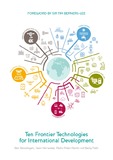| dc.contributor.author | Ramalingam, Ben | |
| dc.contributor.author | Hernandez, Kevin | |
| dc.contributor.author | Prieto Martín, Pedro | |
| dc.contributor.author | Faith, Becky | |
| dc.date.accessioned | 2016-10-28T14:36:35Z | |
| dc.date.available | 2016-10-28T14:36:35Z | |
| dc.date.issued | 2016-11-01 | |
| dc.identifier.citation | Ramalingam, B.; Hernandez, K.; Prieto Martin, P. and Faith, B. (2016) Ten Frontier Technologies for International Development. Brighton: IDS. | en |
| dc.identifier.uri | https://opendocs.ids.ac.uk/opendocs/handle/20.500.12413/12637 | |
| dc.description | The report finds clear evidence of the potential of frontier technologies to contribute to social, economic and political development gains in a number of ways, by:
• Driving innovations in business models, products and processes that provide new goods and services to ‘bottom of the pyramid’ consumers;
• Providing the means by which to make better use of existing underutilised household and productive assets;
• Catalysing increases in demand, nationally and internationally, which create new industries and markets, leading to macro- and microeconomic growth; and
• Changing demand for labour and capital, leading to direct job creation and transformation of the workforce.
For all of the potential upsides, potential downsides must also be considered. While it will largely be the private sector that will drive deployment of these technologies, the public sector through national regulation, as well as development financing, will have a major role in mediating the pace and direction of technological change, both to achieve development objectives, and to protect potential losers. | en |
| dc.description.abstract | As new technologies and digital business models reshape economies and disrupt incumbencies, interest has surged in the potential of novel frontier technologies to also contribute to positive changes in international development and humanitarian contexts. Widespread adoption of new technologies is acknowledged as centrally important to achieving the United Nations Sustainable Development Goals by 2030. But while frontier technologies can rapidly address large-scale economic, social or political challenges, they can also involve the displacement of existing technologies and carry considerable uncertainty and risk. Although there have been significant wins bringing the benefits of new technologies to poor consumers through examples such as mobile money or off-grid solar energy, there are many other areas where the applications may not yet have been developed into viable market solutions, or where opportunities have not yet been taken up in development practice. | en |
| dc.language.iso | en | en |
| dc.publisher | IDS | en |
| dc.rights.uri | http://www.ids.ac.uk/files/dmfile/IDSOpenDocsStandardTermsOfUse.pdf | en |
| dc.subject | Development Policy | en |
| dc.subject | Technology | en |
| dc.title | Ten Frontier Technologies for International Development | en |
| dc.type | Other | en |
| dc.rights.holder | © Institute of Development Studies 2016 | en |
| dc.identifier.team | Digital | en |
| dcterms.dateAccepted | 2016 | |
| rioxxterms.funder | Default funder | en |
| rioxxterms.identifier.project | Default project | en |
| rioxxterms.version | AM | en |
| rioxxterms.funder.project | c941507f-fd0b-4fc3-9822-4b2132f61a1d | en |







